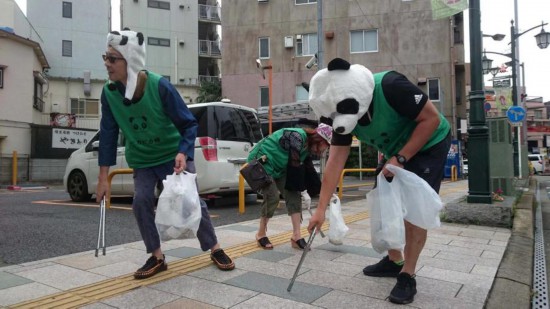Litter removal initiative helps clear up misunderstandings


"When people misunderstand you, don't argue. Prove yourself by doing instead of talking," Chinese woman Aya says about her long-standing volunteer practice of collecting garbage on the streets of Japan.
Aya, who has been in Japan for more than 10 years, runs two Sichuan spicy hot pot restaurants in Japan, including one near Nishikawaguchi station in Saitama Prefecture. There are many Chinese-owned shops near the station, and the area is known locally as Chinatown.
In recent years, the Japanese media, when reporting on the vitality these shops have brought to the local economy, have also expressed concerns about the littering problem.
Shortly after Aya opened her restaurant near the station in 2017, some Japanese media came to interview her about littering. "I don't throw rubbish, and it's not always Chinese who do. But without arguing, I told the reporters I would organize people to clean up," she says.
Aya wrote a long proposal and sent it to the Chinese restaurants and shops nearby, hoping that people would work together to improve the sanitation. The proposal was sent out, but received no response.
"Whether others want to do it or not, now that I have taken the initiative, I will do it myself first," Aya says.
In February 2018, Aya took to the streets and started picking up litter. In the first half year, she acted alone and encountered the incomprehension of many people. But she kept on and was out on the streets between 4 pm and 5 pm on the first Saturday of every month.
Over time, what Aya was doing gradually started being understood by more people. Many local Chinese volunteers joined her, hoping to work together to maintain a clean environment in the neighborhood.
Now the volunteer team has grown to more than 200 people. From Nishikaguchi to Ikebukuro, and from Uano to Yokohama, they regularly organize cleaning activities in commercial districts with overseas Chinese shops. "Our team was named the 'shining squad' and we gave our volunteers vests with a panda logo on them. The panda is the symbol of China, and the Japanese love it, too. I hope that more Japanese people will love China," Aya says.
Through the persistent efforts of Aya and other volunteers, the sanitation situation around Nishikawaguchi has improved significantly. Their volunteer activities have also attracted the attention of Japanese media. After watching the media reports, many Japanese viewers sent Aya postcards and letters to express their gratitude and support.

"Many times, we have had Japanese people pull up in front of us and say, 'Thank you for your hard work.' When some volunteers brought their children here to pick up litter together, some elderly Japanese people would lovingly touch the children's heads, give the thumbs-up and say, 'That's great.' These experiences warm our hearts and make us feel that our efforts are paying off," Aya says.
She was particularly pleased with the positive impact of the effort of the "shining squad" on the development of the local Chinese shops. The local government is considering expanding investment in the infrastructure of "Chinatown" due to the improved sanitation environment, and the annual commercial fair in Nishikawaguchi will also invite overseas Chinese shops to participate.
When asked if she had thought her campaign would have these effects, Aya says, smiling, "I don't think much about it. I just think that if someone around me is in trouble, or someone has any misunderstanding of our motherland, I should try my best to help and to address the misunderstanding."
"This is a matter of course. We just did a very small thing. I hope that through long-term persistence, the Japanese will see the quality of the Chinese people and that it will promote communication and exchanges between the two," she says.




































